Some he killed with a bullet to the back of the head. For others, he had a cup of poisoned tea. He used sophisticated but also completely trivial means. And although his actions quickly became known, he remained completely unpunished. After all, he was not at the places of bestial murder.
The hosts of the Kremlin are very memorable people. It is enough to get under their skin at least once to never fall asleep peacefully again. In 1940, Lev Trotsky found out about it. The revenge of the dignitaries of Red Square reached him in faraway Mexico. The NKVD agent smashed his head with his pickaxe. Stepan Bandera, who was poisoned with cyanide in 1959, met no less cruel fate. On the other hand, a dissident and emigrant from the Bulgarian People's Republic, Georgi Markow, experienced almost 20 years later on his own skin how the Bulgarian umbrella works. A lethal tool was used against him in London in 1978.

Vladimir Putin. How many people has the president of Russia murdered with someone else's hands?
The Soviet Union collapsed, but it seems that proven methods of silencing oppositionists have remained the same. But what else can you expect if the former KGB officer Vladimir Putin and his clique are in charge of the state?
Less you know, you live longer
The current president of Russia gained his first political skills alongside the mayor of St. Petersburg, Anatoly Sobchak. His duties included, among other things, importing food from abroad in exchange for wood and other raw materials. As it turned out later, the documentation was kept very sloppy. It was missing a seal on contracts with delivery companies, it was some kind of signature. In short, the papers were invalid. 34 million dollars vanished from the budget, and food still did not reach the needy.
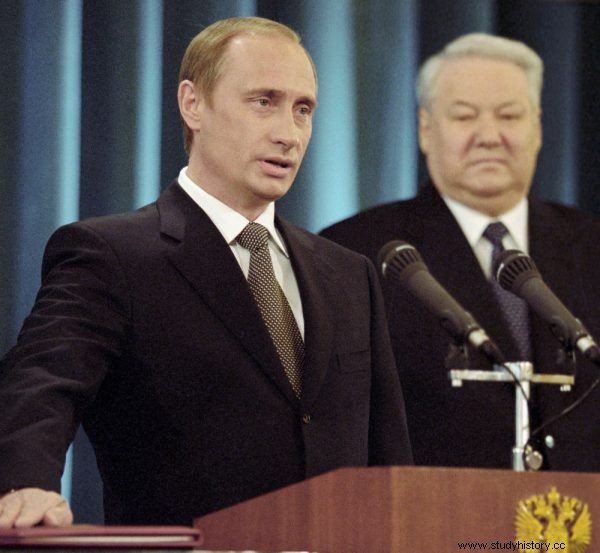
Soon after Putin took office, people who were against him began to die.
City councilor Marina Salje became interested in the case of unsuccessful deliveries and collected reliable evidence. He clearly indicated - to put it mildly - Putin's mismanagement. Both Sobchak and the then president of Russia, Boris Yeltsin, read her report. Nevertheless, they took no action against the co-worker squandering public money.
Putin, although he was granted impunity, did not forget about too inquisitive colleagues from the City Council when on December 31, 1999 he took over the duties of head of state from Yeltsin. During the election campaign in 2000, he asked Sobczak to agitate for his candidacy in the Kaliningrad Oblast. By a strange coincidence, a few days later the politician died of a heart attack in a hotel in Svetlogorsk.
The case looked suspicious from the very beginning. For unknown reasons, two autopsies were performed - one in Kaliningrad and the other in St. Petersburg. The latter took place in a hospital where the then Minister of Health, Yuri Shevchenko, practiced medicine. The murder investigation initiated by the Kaliningrad Prosecutor's Office was closed after 3 months without giving any reason.
Investigative journalist Arkady Waksberg suggested that Sobchak was poisoned using the "light bulb" method. When the light is turned on, the bulb heats up while releasing poison previously placed on it. It must have hit a sensitive point, since his car exploded shortly after the publication of this revelation. Luckily, the journalist wasn't inside.
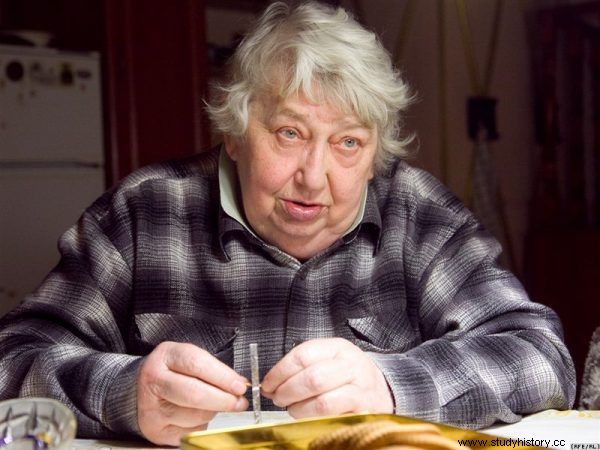
Marina Salje criticized Putin even before he was elected president. No wonder she didn't feel safe until the end of her life.
Also, Marina Salje did not feel safe, although according to one rumor she received special New Year's greetings from Putin: I wish you good luck in the New Year and good health to be able to enjoy it. However, it only took one meeting for her to leave Moscow and settle in the village of Ladino in the Pskov region at the northwestern tip of Russia.
Salje had an appointment with the liberal politician Sergey Yushenkov. Not only he, but another man appeared at the meeting. It was he who scared her. Who was? It is not known. It is known that on April 17, 2003, Yushenkov was shot. According to the official version, the murder was ordered by the oligarch Boris Berezovsky.
Nothing tastes like tea in London
The Russian billionaire was closely associated with Boris Yeltsin's milieu. This is how his relationship with Putin is described by Mikhail Zygar in his book "All the people of the Kremlin":
Berezovsky met Putin in the early 1990s and it was he who introduced the former deputy mayor of St. Petersburg, Anatoly Sobchak, to Boris Yeltsin's closest circle. In the summer of 1999, Berezovsky also began to bear the idea that Putin was the best candidate for the successor to the incumbent president. However, at the end of 1999, this idea began to live its own life. Bieriezowski had nothing to do with him. Over time, this idea began to bother him more and more.
As early as 2001, Berezovsky had to flee to Great Britain to avoid a penal colony. At the same time, Aleksandr Litvinenko, a secret services agent, also received British citizenship. He specialized in investigating organized crime and recruited collaborators in Chechnya for Russian intelligence.
Both escapees knew each other before. They met in 1994 and quickly liked each other. It was the oligarch, concerned about the growing position of the former KGB officials, who persuaded Litvinenko to reveal the pathologies that took place in the services. Litvinenko decided to publicly inform about the Federal Security Service's ties with the criminal world during a press conference broadcast by all televisions.
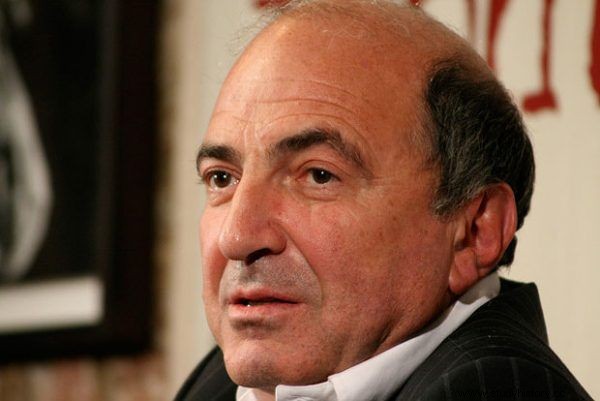
Boris Bieriezowski was one of the first to put forward the idea of Putin - the president. Not long after that, he had to flee Russia from the new head of state.
At that time, the head of the FSB was already - from 25 July 1998 - by Putin, who made sure that his old comrades did not lose a hair from their heads. And he never forgave Litvinenko's betrayal. The agent was discharged from service in January 1999. Subsequently, the prosecutor accused him of exceeding his powers. When his conviction was unsuccessful, he was arrested on the same day as the court's decision on a different pretext. In total, the former counterintelligence spent almost nine months in custody on various charges. Eventually he managed to escape to Great Britain, where he was granted political asylum.
In London, Litvinenko and Berezovsky launched a campaign against Putin. The president of Russia was accused of blowing up apartment blocks in order to get an excuse to attack Chechnya. The list of charges also included drug trafficking, arms trafficking, supporting al-Qaeda, and even ... Putin's own pedophile tendencies.
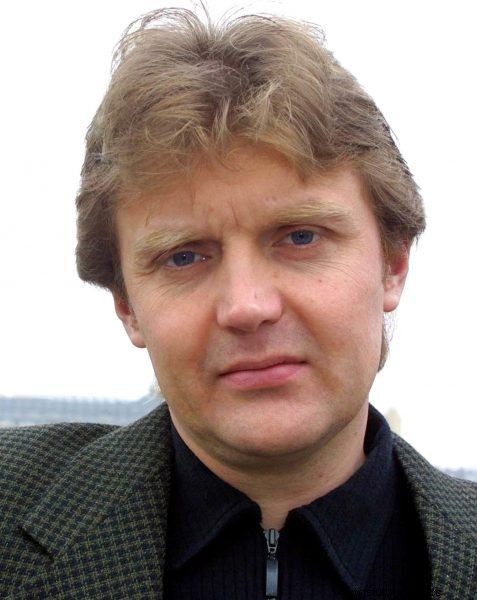
The murder of Alexander Litvinenko is one of the most famous murders commissioned by Vladimir Putin.
On November 1, 2006, Alexander Litvinenko met with Russian politician and entrepreneur Andrei Lugovoy at the Manhattan Hotel in London. They wanted to discuss a business proposal. Unexpectedly, they were joined by a certain Vladimir, who was not particularly engaged in the conversation. He was more busy not to let Litwinien run out of tea. As it turned out later, it was the cup that contained radioactive polonium, which contributed to the death of the agent. On the same day, Litvinenko had another meeting with Lugovoy in the hotel bar. They were accompanied by their fellow politician, Dmitry Kovtun. Tea appeared on the table again.
When Litvinenko returned home, he complained of abdominal pain and general malaise. The next day an ambulance was called, but the medics only advised him to drink plenty of fluids. Eventually he ended up in the hospital. The following days brought even more suffering. His hair began to fall out, and abscesses appeared in his throat. Litvinenko admitted that he would rather spend a year in a Russian prison than go through such torments again ... Nothing could be done. He died in agony on November 23, 2006.
The hypothesis that there was deliberate poisoning appeared only after two weeks. Thallium was initially suspected. However, after careful examination, it turned out that the deadly substance was radioactive polonium-210, which only after getting inside the body becomes a deadly poison. His traces have been found in taxis, hotels, airplanes and even in the stadium seat. Everywhere where the Lugovoy and Kovtun attackers were present. When it was announced that Litvinenko had been poisoned with a radioactive substance, they were both in Russia a long time ago. To this day, they do not have to fear extradition.
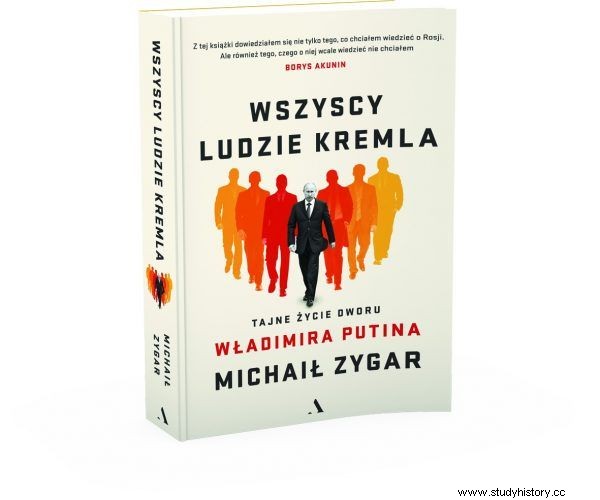
A few years later, on March 23, 2013, Boris Bieriezowski died. There is a lot of evidence that he committed suicide. However, the coroner investigating the case did not rule out the participation of third parties. The death of Matthew Puncher, the scientist who detected traces of polonium in Litvinenko's body, is also suspected. In November 2016, he was found dead in his home. He had numerous stab wounds on his body. It was also supposed to be a suicide.
Poison for the uncomfortable
The case of Litvinenko was by no means the first and only when poison was used to eliminate political opponents. A similar fate befell the deputy editor-in-chief of Novoy Gazeta, Yuri Shchekochikhin. He dealt with describing corruption scandals involving officials of the judiciary and high-ranking officials of the secret services.
In June 2003, the journalist was hospitalized with symptoms of an allergic reaction. Initially, he complained of burning sensation throughout his body and vomiting. After a week in the hospital, he fell into a coma. He died on the night of July 2–3, 2003 of multiple organ failure caused by an unknown poison.
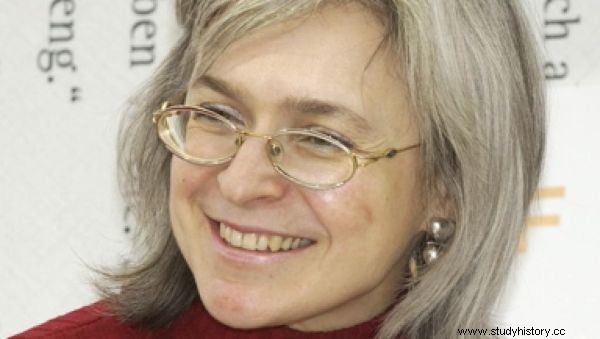
Was Anna Politkovskaya's head a birthday present for Vladimir Putin?
Anna Politkovskaya, an uncompromising journalist and human rights defender in Chechnya, was also attempted to poison her. Once, after drinking tea ordered on board an airplane, she suddenly passed out. Doctors in Rostov miraculously saved her life. The poison severely damaged her kidneys and liver. Another, this time a successful coup was carried out in a more classic way. Two years after the attack on the plane, Politkovskaya was shot. It happened on October 7, 2006. Vladimir Putin's birthday.
Targeted by power
Three years after the journalist's death, on January 19, 2009, there was a double murder in the very center of Moscow. The lawyer of journalists and Chechens injured in the war, Stanisław Markelov, and the journalist of "Novoj Gaziety", Anastasia Baburowa, were shot by a masked assassin. According to investigative bodies, neo-Nazi organizations were behind the murder.
In the same year, Natalia Estemirova, a journalist describing human rights violations in Chechnya, was kidnapped. She repeatedly informed about cases of mysterious kidnappings that took place in the republic enslaved by Putin. Her body was found on the road to Nazran in Ingushetia. It had bullet marks on its chest and head. The perpetrators have not yet been found.
An even more audacious murder took place on February 27, 2015. Boris Nemtsov was shot dead on the Great Moscow Bridge, just outside the Kremlin walls. He was one of the opposition leaders who had been at stake with Putin for a long time. The murder took place the day before the planned demonstration of the opposition, which eventually turned from a political rally into a march of memory. This time the bravado and recklessness of the bombers probably frightened Putin himself. The Russian president met with representatives of the power ministries that same night and demanded a thorough investigation.
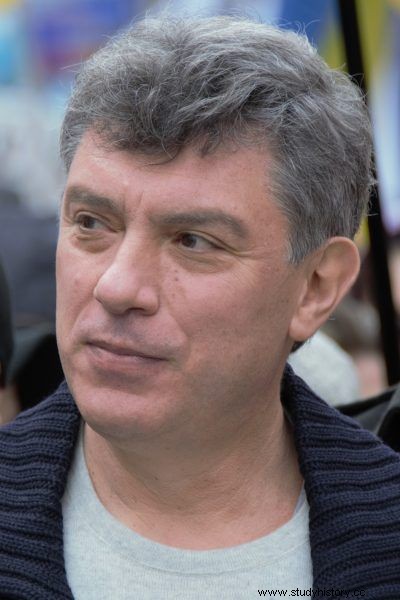
Boris Nemtsov - one of Putin's last victims.
Suspects were quickly found. One of them, Beslan Shawanov, blew himself up with a grenade while trying to arrest. In turn, Zaur Dadaev, a Chechen military man, even confessed to the murder. However, he later withdrew all testimony, arguing that it had been extorted by torture. The process is still running.
In the context of the murder of Nemtsov, a key figure is Ramzan Kadyrov, Putin's eminent admirer and head of the Chechen Republic. In his book "All the people of the Kremlin," Mikhail Zygar points out a strange coincidence. In 2008, when Putin was prime minister, Kadyrov's opponent Ruslan Yamadayev was murdered literally in front of his seat, known as the "White House". Interestingly, his killer was also called Dadaev.
Embassy directs the homicide
The 2008 coup was not the only action aimed at Chechen fighters. A similar situation took place 4 years earlier. Agents of the Russian Main Intelligence Directorate (GRU), together with the first secretary of the Russian embassy in the capital of Qatar, Doha, attacked Zelimchan Jandarbijew. The bomb was planted under the car in which he was returning from prayer with his teenage son. Zelimchan was killed instantly and his son was seriously injured.
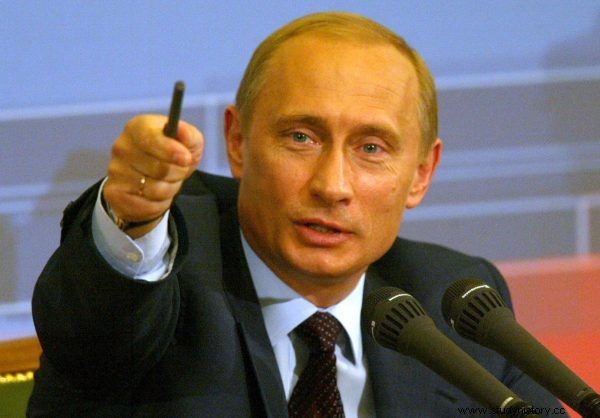
If Putin identifies the victim, her death is only a matter of time.
In the 1990s, Jandarbijew sat at the highest positions in the Caucasian republic. Later, he turned from a Chechen nationalist into an Islamic radical. The authorities of the Russian Federation accused him of organizing the attack on Dubrovka in 2002. He settled in Qatar after escaping from Russia. He enjoyed hospitality there by the Emir himself. It didn't save his life though.
The first secretary of the Russian embassy, Alexander Fetisov, was expelled from Qatar. He was the de facto mastermind of the entire operation. Nothing else could be done to him as he had a diplomatic passport. Soon after the bomb explosion, the assassins were also caught:Anatoly Jablochkov and Vasily Pugachev. They were sentenced to life imprisonment. As a result of negotiations between Russia and Qatar, however, they were allowed to return to the country. They were to serve the rest of the sentence there. Nothing like that happened. After a loud greeting at the airport in Moscow on the night of December 23-24, 2004, they were not heard of.
***
During an interview with Donald Trump, (former) Fox News journalist Bill O'Reilly did not hesitate to call the Russian president a murderer. It did not take long for a reaction from Moscow to come. A Kremlin spokesman immediately demanded an apology from the television. The journalist promised to do this, but not earlier than 2023. Why did he choose such a date? It is not known. However, there are indications that the list of victims of the Putin regime may increase by then.
In the Kremlin, they had already assured them that they would patiently wait for the words of repentance.
